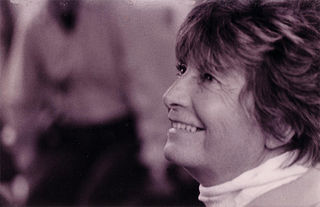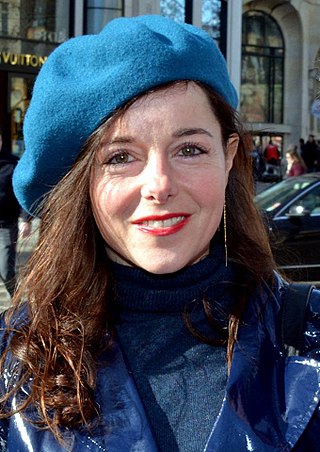Related Research Articles

Mário Coelho Pinto de Andrade was an Angolan poet and politician.

Cinema of Africa covers both the history and present of the making or screening of films on the African continent, and also refers to the persons involved in this form of audiovisual culture. It dates back to the early 20th century, when film reels were the primary cinematic technology in use. During the colonial era, African life was shown only by the work of white, colonial, Western filmmakers, who depicted Africans in a negative fashion, as exotic "others". As there are more than 50 countries with audiovisual traditions, there is no one single 'African cinema'. Both historically and culturally, there are major regional differences between North African and sub-Saharan cinemas, and between the cinemas of different countries.

Sarah Maldoror was a French filmmaker of French West Indies descent. She is best known for her feature film Sambizanga (1972) on the 1961–1974 war in Angola.

Anne Cuneo was a Swiss journalist, novelist, theatre and film director and screenwriter.
Sambizanga is a 1972 film directed by Sarah Maldoror and written by Maldoror, Mário Pinto de Andrade, and Maurice Pons, based on the 1961 novella The Real Life of Domingos Xavier by José Luandino Vieira. Set in 1961 during the onset of the Angolan War of Independence, it follows the struggles of Angolan militants involved with the Popular Movement for the Liberation of Angola (MPLA), an anti-colonial political movement. Maldoror co-wrote the screenplay with her husband, who was a leader within the MPLA. Sambizanga was the first feature film produced by a Lusophone African country.

Michèle Causse was a French activist, author, and self-described radical lesbian.
Mahama Johnson Traoré (1942–2010) was a Senegalese film director, writer, and co-founder of the Ouagadougou-based Pan-African Cinema Festival (FESPACO).

Juliette Benzoni was a French author and international bestseller in several genres, including historical romance, historical fiction, mystery and screenwriting. In 1998, at the age of 78, she received the Chevalier de l'Ordre National from President Jacques Chirac.
Femmes aux yeux ouverts is a Togolese documentary film directed by Anne-Laure Folly. It covers the lives of contemporary African women in Burkina Faso, Mali, Senegal and Benin.
Anne-Laure Folly is a documentary film maker from Togo.
Les Oubliées is a 1996 documentary film directed by Anne-Laure Folly of Togo and shot in Angola.

Gisèle Casadesus was a French actress, who appeared in numerous theatre and film productions. She was an honorary member of the Sociétaires of the Comédie-Française, Grand Officer of the Legion of Honor, Officer of the Ordre des Arts et des Lettres, and Grand-Croix of the National Order of Merit. In a career spanning more than 80 years, Casadesus appeared in more than a dozen films after turning 90.
Charlotte Dubreuil is a French filmmaker and novelist. After two small acting roles, Dubreuil turned her attention to writing and directing. She has written and directed several French films as well as produced two novels.
Sandra Kogut is a filmmaker born 1965 in Rio de Janeiro, Brazil, whose works transition between documentary and narrative fiction. She first received international attention for her 1991 documentary Paralamas do Sucesso. Kogut has taught at renowned universities around the world and has worked for Brazilian and European broadcasters. Her debut feature film project was the multi award-winning Mutum in 2007. She is more recently known for Campo Grande (2015), which had its premiere in the Contemporary World Cinema section of the 2015 Toronto International Film Festival.

Laure Calamy is a César Award-winning French film, TV and theatre actress best known for her roles in Call My Agent! and My Donkey, My Lover & I.
Anne Hugon is a French historian specialising in the history of African exploration.
Cinema in Togo began with German colonial filmmakers visiting Togoland. The French attempted to suppress cinema in French Togoland. After the Togolese Republic gained independence in 1960, Togo's national government encouraged cinema, though government support for cinema lapsed when French funding was withdrawn in the 1990s. More recently, however, the film industry is once again growing in Togo.
Women are involved in the African film industry in a variety of roles, though they have been underrepresented in creative positions.
Mounira Bhar is a Tunisian filmmaker. She holds a Master of Advanced Studies in aesthetic philosophy obtained at the Sorbonne.
Aï Keïta Yara is a Burkinabè actress who played the lead role in the 1986 film Sarraounia.
References
Citations
- ↑ Le film africain 1999, p. 30.
- ↑ Anne Laure Folly - WMM.
- ↑ Association des trois mondes 2000, p. 205.
- ↑ Ellerson 2010.
Sources
- "Anne Laure Folly". Women Make Movies. Retrieved 2013-02-08.
- Association des trois mondes (2000). Les cinémas d'Afrique: dictionnaire. KARTHALA Editions. p. 205. ISBN 978-2-84586-060-5 . Retrieved 9 February 2013.
- Ellerson, Beti (27 January 2010). "A Profile of Sarah Maldoror". African Women in Cinema Blog. Retrieved 2013-02-09.
- Le film africain. Marché international du film d'Amiens. 1999. Retrieved 28 December 2012.